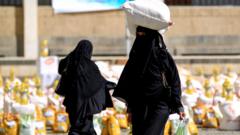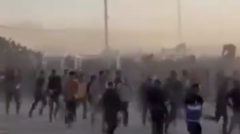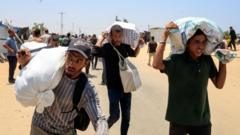The ongoing civil war in Yemen has escalated, leading to increased detentions of aid workers and exacerbating the humanitarian crisis. The fear of retribution among humanitarian staff is palpable, as raids by Houthi rebels result in severe restrictions on NGOs. With a significant portion of the population in dire need of support, both local and international aid efforts are critically threatened.
Humanitarian Crisis Deepens in Yemen Amidst Raids and Arrests of Aid Workers

Humanitarian Crisis Deepens in Yemen Amidst Raids and Arrests of Aid Workers
A wave of arrests and raids on NGOs cripple humanitarian aid efforts in war-torn Yemen, where half the population is in desperate need of assistance.
As Yemen's civil war drags on, the situation for humanitarian workers has become increasingly dire. Hanaa, who works for a US-funded NGO that empowers women and fosters negotiation skills, found her office ransacked and her boss arrested upon arrival to work one day. The organization faced the confiscation of devices and a freeze on their bank account, a direct consequence of the Houthi rebels' crackdown on aid organizations amid a deepening humanitarian crisis.
With over half the Yemeni population requiring urgent humanitarian assistance, including nearly 10 million children, fears regarding the safety of aid workers have escalated dramatically. The detention of 24 UN employees and other local and international NGO workers in recent months has created a pervasive climate of fear. High-profile cases, such as a World Food Programme employee who died in custody, have heightened concerns for many workers.
The Houthi actions have been interpreted by many in the sector as an effort to instill fear within the public, but an even more troubling aspect for Hanaa has been the burgeoning perception of aid workers as spies. Following the detention of her boss, she sought refuge in southern Yemen, struggling emotionally with the upheaval of her life. Her trauma has deepened recently due to United States President Donald Trump’s decision to classify the Houthis as a terrorist organization, casting a shadow of fear over those working in US-funded initiatives.
Abdulaziz, a lawyer representing 14 detainees, shared grievances about the dismal nature of support for those in custody. His clients, including three UN personnel, have faced months of silence and isolation. Abdulaziz expressed concern over the unknown fates of many held without communication, leading to questions about their overall treatment.
In response to the rising tension, humanitarian assistance from the United States Agency for International Development (USAID) has been suspended due to allegations of mismanagement and waste, as per President Trump’s measures. Human Rights Watch has raised alarms that these policies, paired with arbitrary arrests by the Houthis, are wreaking havoc on aid provision, warning they will have “massive and dramatic impacts” on those in need.
Voices from affected families echo the urgent need for aid; Amal, a mother living in a camp for displaced individuals, recounted the severe strain of supporting her nine children amidst scarce resources. Reflecting on her abject circumstances, she lamented, “Cutting aid would be a death sentence to us.” The gravity of the situation in Yemen is daunting, with UNICEF reporting about 4.5 million internally displaced people struggling to find necessities, ranging from food to medical care.
As the Yemeni humanitarian crisis escalates, UN Special Envoy for Yemen Hans Grundberg condemned the detentions as a violation of basic human rights. He called for the immediate release of all detained aid workers, stressing the detrimental effect on the UN’s capability to assist those most in need.
Contrary to the challenges, Hanaa and her colleagues have achieved successes, such as sending girls to school in conservative areas through community discussions. However, with ongoing crackdowns and a looming threat to funding and support, the risk of rising illiteracy and chronic poverty hangs heavily over Yemen. With many aid workers now working under veiled identities for safety, the sustainability of support systems remains precarious amidst the chaos of war.





















